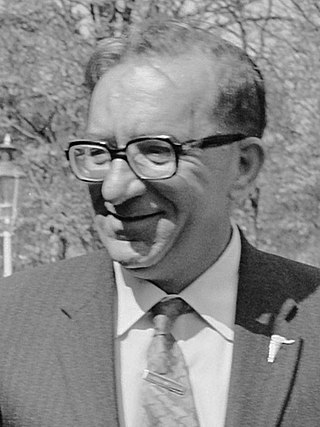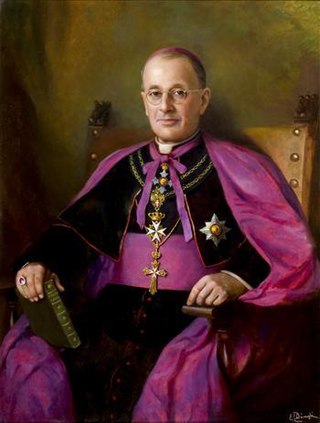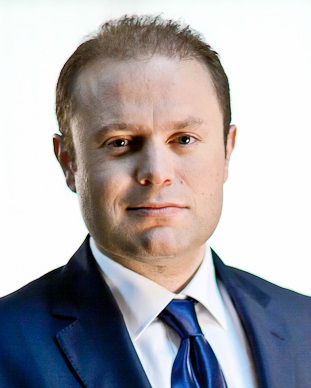Related Research Articles

Malta has been inhabited since 5900 BC. The first inhabitants were farmers; their agricultural methods degraded the soil until the islands became uninhabitable. The islands were repopulated around 3850 BC by a civilization that at its peak built the Megalithic Temples, which today are among the oldest surviving buildings in the world. Their civilization collapsed in around 2350 BC; the islands were repopulated by Bronze Age warriors soon afterwards.

Dominic Mintoff was a Maltese socialist politician, architect, and civil engineer who was leader of the Labour Party from 1949 to 1984, and was 8th Prime Minister of Malta from 1955 to 1958, when Malta was still a British colony, and again, following independence, from 1971 to 1984. His tenure as Prime Minister saw the creation of a comprehensive welfare state, nationalisation of large corporations, a substantial increase in the general standard of living and the establishment of the Maltese republic, but was later on marred by a stagnant economy, a rise in authoritarianism and outbreaks of political violence.

Edoardo "Eddie" Fenech Adami is a Maltese politician and Nationalist politician who served as the prime minister of Malta from 1987 until 1996, and again from 1998 until 2004. Subsequently, he was the seventh president of Malta from 2004 to 2009. He led his party to win four general elections, in 1987, 1992, 1998 and 2003, as well as the majority of votes in 1981. Staunchly pro-European, Fenech Adami was fundamental for Malta's accession to the European Union.

Giorgio Borg Olivier was a Maltese statesman and leading politician. He twice served as Prime Minister of Malta as the Leader of the Nationalist Party. He was also Leader of the Opposition between 1955–1958, and again between 1971–1977.

The University of Malta is a higher education institution in Malta. It offers undergraduate bachelor's degrees, postgraduate master's degrees and postgraduate doctorates. It is a member of the European University Association, the European Access Network, Association of Commonwealth Universities, the Utrecht Network, the Santander Network, the Compostela Group, the European Association for University Lifelong Learning (EUCEN) and the International Student Exchange Programme (ISEP).

The Small Island Developing States (SIDS) are a grouping of developing countries which are small island countries and tend to share similar sustainable development challenges. These include small but growing populations, limited resources, remoteness, susceptibility to natural disasters, vulnerability to external shocks, excessive dependence on international trade, and fragile environments. Their growth and development are also held back by high communication, energy and transportation costs, irregular international transport volumes, disproportionately expensive public administration and infrastructure due to their small size, and little to no opportunity to create economies of scale. They consist of some of the most vulnerable countries to anthropogenic climate change.

Moviment Graffitti is a left-wing radical environmentalist non governmental organisation and pressure group in Malta.

Labour Youths, formerly known as the Labour Youth Forum until 2021, the Young Socialist League until 1992 and the Labour League of Youth until 1974, is the youth organisation of the Labour Party of Malta. ŻL is also active internationally and is an active member within the International Union of Socialist Youth and the Young European Socialists.

Sir Michael Count Gonzi, was Roman Catholic Archbishop of Malta from 1944 until 1976. He had been enthroned as Bishop of Malta in December 1943, and was consecrated as the first Archbishop of Malta in 1944. He had also been Bishop of Gozo and an elected Labour Senator in the Malta Legislative Assembly.
A vulnerability index is a measure of the exposure of a population to some hazard. Typically, the index is a composite of multiple quantitative indicators that via some formula, delivers a single numerical result. Through such an index "diverse issues can be combined into a standardised framework...making comparisons possible". For instance, indicators from the physical sciences can be combined with social, medical and even psychological variables to evaluate potential complications for disaster planning.

The Crown Colony of the Island of Malta and its Dependencies was the British colony in the Maltese islands, today the modern Republic of Malta. It was established when the Malta Protectorate was transformed into a British Crown colony in 1813, and this was confirmed by the Treaty of Paris in 1814.
Prof. The Honourable Bishnodat Persaud CHB, Ph.D., FRSA was a Guyanese economist who served as Alcan Professor of Sustainable Development at the University of the West Indies, and Director of Economic Affairs, Commonwealth Secretariat. In November 2013 he was awarded The Companion of Honour in the Barbados Independence Day Honours List for distinguished national achievement and merit for his outstanding contribution to the regional and international public service.

Lino Bianco is a Maltese architect, academic and diplomat.
Lino Spiteri was a Maltese writer and politician. He served as Finance Minister from 1981 to 1983, and again from 1996 to 1997.

The contributions of women in climate change have received increasing attention in the early 21st century. Feedback from women and the issues faced by women have been described as "imperative" by the United Nations and "critical" by the Population Reference Bureau. A report by the World Health Organization concluded that incorporating gender-based analysis would "provide more effective climate change mitigation and adaptation."
Godfrey Baldacchino is a Maltese and Canadian social scientist. He was Pro Rector (2016-2021) and Professor of Sociology at the University of Malta. Between 2016 and 2020, he was with Jim Randall, the UNESCO Co-Chair in Island Studies and Sustainability at the University of Prince Edward Island, Canada.

The 2019 European Parliament election was held in Malta on 25 May 2019. 8 different political parties took part in the election, of which, only 2 won seats in the European Parliament; the Labour Party and the Nationalist Party, with 4 and 2 seats respectively.

The Malta–Gozo Tunnel was a planned undersea tunnel between the islands of Malta and Gozo, both part of the Republic of Malta. The tunnel would have replaced the Gozo Channel Line, the current inter-island ferry service, between Ċirkewwa in Malta and Mġarr in Gozo.

Carm Lino Spiteri, also known by his nickname Iċ-Ċumpaqq, was a Maltese architect and politician. He was a member of the House of Representatives with the Nationalist Party between 1971 and 1987, and again between 1992 and 1996.
Climate change vulnerability is a concept that describes how strongly people or ecosystems are likely to be affected by climate change. Its formal definition is the "propensity or predisposition to be adversely affected" by climate change. It can apply to humans and also to natural systems. Issues around the capacity to cope and adapt are also part of this concept. Vulnerability is a component of climate risk. It differs within communities and also across societies, regions, and countries. It can increase or decrease over time. Vulnerability is generally a bigger problem for people in low-income countries than for those in high-income countries.
References
- 1 2 3 4 5 Uwe Jens Rudolf, Historical Dictionary of Malta, Rowman & Littlefield 2018 - entry on "Lino Briguglio"
- ↑ Malta Today, 24 Feb 2023
- 1 2 Times of Malta, 26 Aug 2012
- 1 2 Malta Today,4 July 2007
- ↑ Michael Briguglio, M.A. Thesis, p.153, fn.7
- ↑ Times of Malta, 29 Aug 2012
- ↑ "In order to control the Union, changes had to take place within the statutes of both organisations" (L-Invell, October 1978).
- ↑ "University of Malta -Faculty of Economics, Management and Accountancy". University of Malta. Retrieved 2010-04-25.
- ↑ "University of Malta - Gozo Centre". University of Malta. Retrieved 2010-04-25.
- ↑ "SSNED - Board of Trustees". Small States Network for Economic Development. Archived from the original on 2009-09-07. Retrieved 2010-04-25.
- ↑ "Lino Briguglio - Director of the Small States Network for Economic Development". Small States Network for Economic Development. Archived from the original on 2009-09-07. Retrieved 2010-04-25.
- ↑ "Professor Lino Briguglio at the University of Malta". University of Malta. Retrieved 28 April 2010.
- ↑ Pereira, Edwina E.; Steenge, Albert E. (1 September 2022). "Vulnerability and Resilience in the Caribbean Island States; the Role of Connectivity". Networks and Spatial Economics. 22 (3): 515–540. doi: 10.1007/s11067-021-09533-w . ISSN 1572-9427. PMC 8159251 . PMID 34075312.
- ↑ Briguglio, Lino (1992). "Preliminary Study on the Construction of an Index for Ranking Countries According to their Economic Vulnerability". UNCTAD/LDC/Misc.4.
- ↑ Zammit, Anne (17 January 2010). "After Copenhagen, what now?". Times of Malta. Retrieved 20 April 2010.
- ↑ "Report on the International Workshop on Economic Vulnerability and Resilience of Small States" (PDF). Commonwealth Secretariat. Archived from the original (PDF) on 2010-07-06. Retrieved 2010-04-25.
- ↑ whoswho.mt